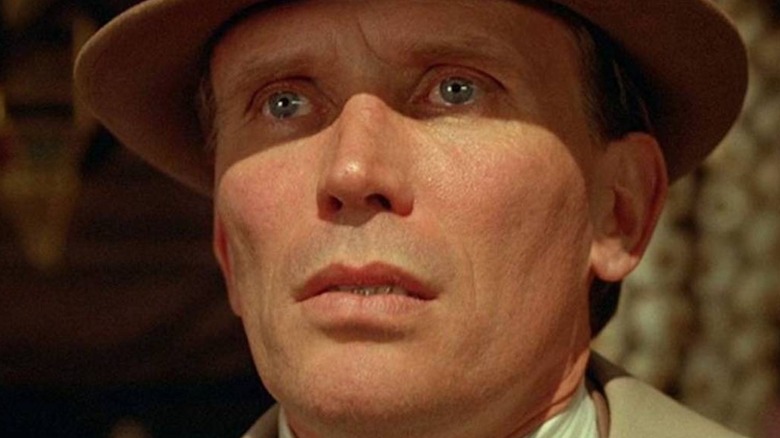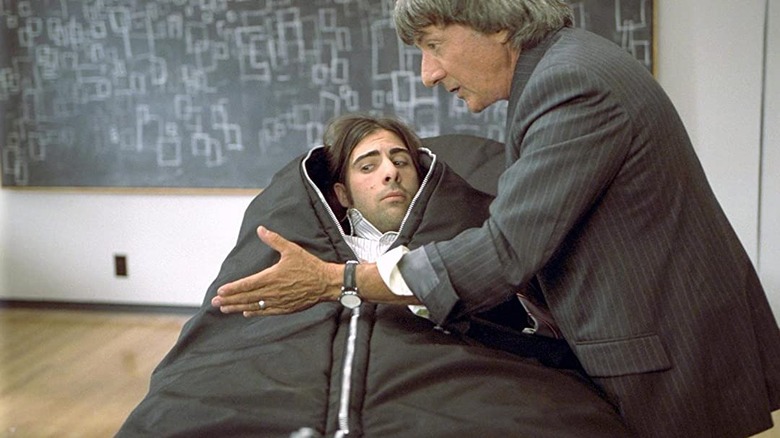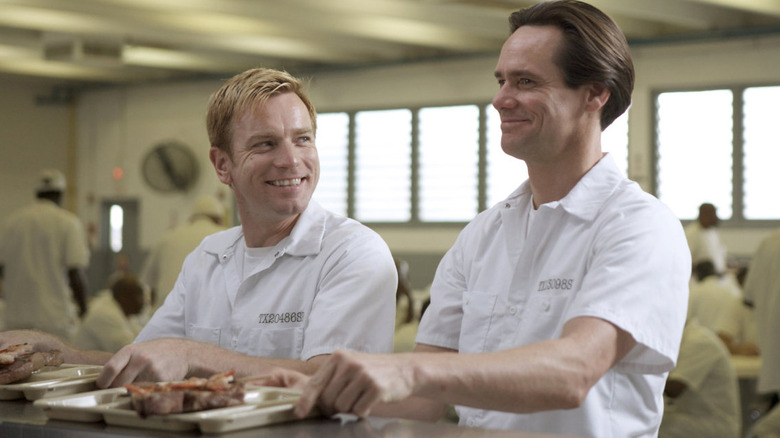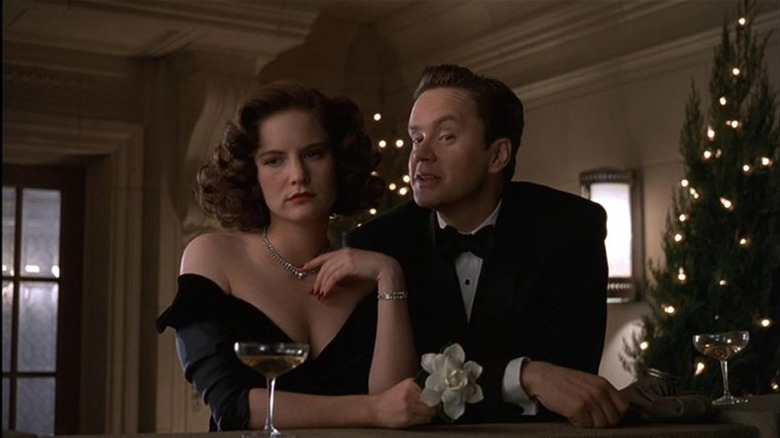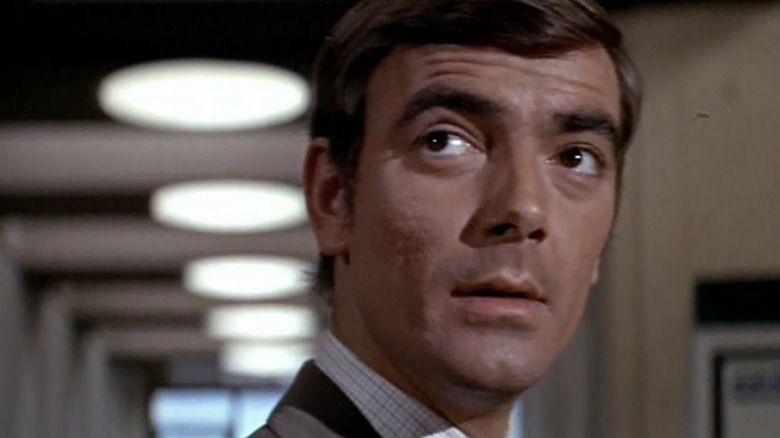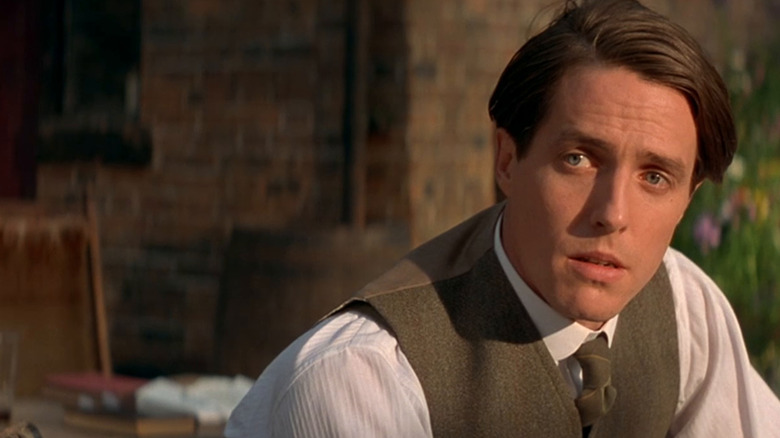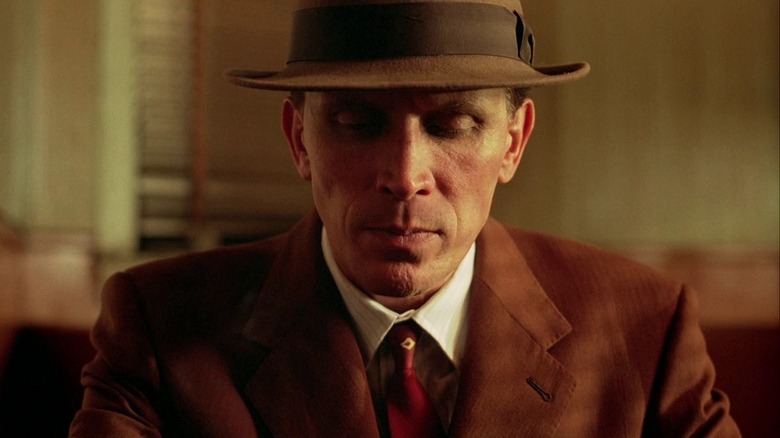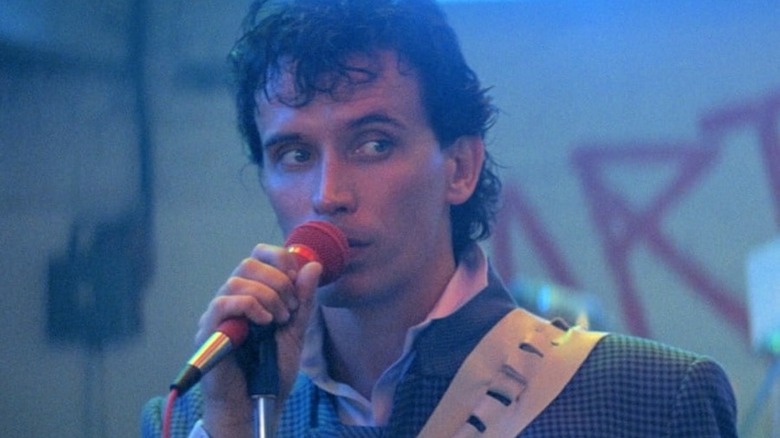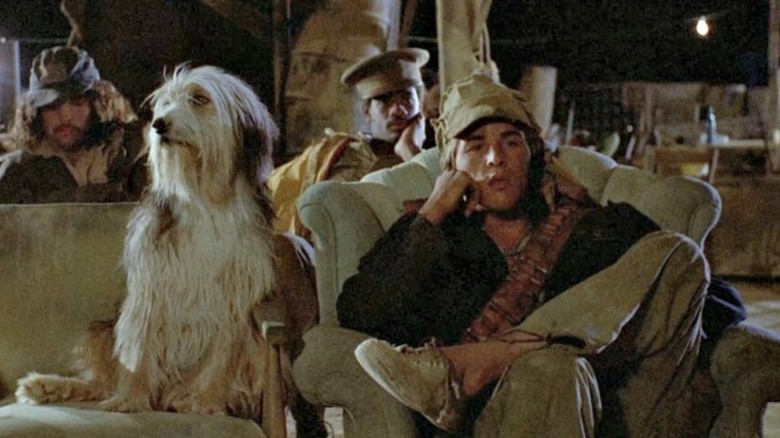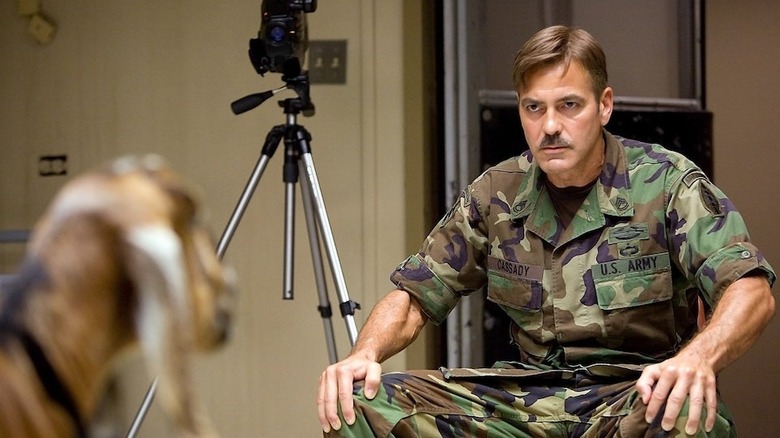Movies With Terrible Titles That Doomed Them From The Start
Any marketing guru will tell you the power that lies in a name. Nowhere is this more noticeable than in the movie business, where so much of a film's success is dependent on its brief theatrical run. If a movie has an off-putting, confusing, or unwieldy title, it can disorient audiences, turn away potential customers, and kill its chances at the box office, making a possible blockbuster into a bomb.
It's no coincidence after all that the titles of some of the biggest, most beloved, and successful films are simple, straightforward, and attention-grabbing. From "Star Wars" and "The Godfather," to "Avengers: Endgame" and "Armageddon," the biggest and most widely-loved movies of every generation often understood how critical it is to have a strong title. But there are plenty of movies out there where the name alone may have squashed any prospects before it even had a chance to find success.
A movie title doesn't just have the power to confuse or alienate viewers in cinemas. It can even alter the expectations and perception of critics, leading to worse reviews than they might have gotten otherwise. So if you've ever looked at a movie title and cringed, this list is for you: movies with titles so terrible it doomed them from the start.
I ♥ Huckabees
"I ♥ Huckabees" may never have been destined to be a box office hit. Described by reviewers as an "existential comedy," its exploration of deeper themes and the meaning of life itself alienated some casual audiences and critics, and it received a decidedly divisive reaction. Centered on a pair of philosopher detectives, it sees Bernard and Vivian (Dustin Hoffman and Lily Tomlin) hired by Albert (Jason Schwartzman) to try to connect the disparate dots in his life as part of what they call "universal interconnectivity."
The film's less-than-obvious plot, combined with its more philosophical ideas clearly confounded some viewers, but the title probably didn't help lure in audiences. For starters, the use of the heart emoji made it confusing right out of the gate, as nobody was quite sure if they should call the movie "I Heart Huckabees" or "I Love Huckabees." And what was "Huckabees" anyway? Regardless of a movie's quality, it's never a good idea for an already-off-kilter film to make moviegoers scratch their head before they even buy a ticket.
Ultimately, if you're making a more avant-garde movie, perhaps the lesson here is to balance it out with a more straightforward, pleasing title to attract an audience. While we'll never know if something like "The Existential Detectives" would have sold more tickets, it certainly couldn't have hurt.
I Love You Phillip Morris
On the surface, the title of "I Love You Phillip Morris" seems entirely apropos. Released in 2009, it was a rare mainstream LGBTQ romantic comedy, centered on Steven Jay Russell (Jim Carrey), an average family man who realizes he's gay and leaves his family behind. After winding up in prison after some white-collar crime, Steven falls in love with fellow inmate Phillip Morris (Ewan McGregor). Based on a true story and inspired by the memoirs of the real Steven Jay Russell, "I Love You Phillip Morris" is an endearing rom-com mixed with some mild thriller elements. It received stellar reviews, and the title at first glance seems perfectly apt.
The problem however is that the name Phillip Morris is also closely associated with the tobacco industry. In fact, Philip Morris is the world's leading tobacco conglomerate, and owner of such brands as Marlboro, Chesterfield, and Benson & Hedges. Sharing its name with such a well-known corporation involved in a controversial industry, it's understandable if some prospective audience members were confused. Perhaps they thought the movie was a quirky film about one of the many infamous scandals the multinational corporation has been involved in, but that was definitely not the case.
Because "I Love You Phillip Morris" has nothing to do with the tobacco industry, the fact that the cigarette company uses one "L" instead of two in its name wasn't enough to clear up any possible confusion.
The Assassination of Jesse James by the Coward Robert Ford
In many instances, a bad title can doom a film by confusing an audience with its cryptic nature, or even misleading them outright. But in the case of "The Assassination of Jesse James by the Coward Robert Ford," the title essentially spells out the ending of the film's story in very literal terms. The film is about both men, and the entire narrative leads up to the ultimate assassination. As such, the title may have felt a little revealing, with some audiences possibly thinking it was something of a spoiler for the film's conclusion.
But the movie is not a murder mystery at all, and not really even about the assassination itself. It's an intimate portrait of two men: Jesse James — the audacious Western gunslinger who made a name for himself as an outlaw — and Ford, a new recruit to his gang who becomes resentful of the fame Jesse has amassed, and both were well-chronicled real-life figures. In short, it doesn't matter if you know the assassination is coming, because this is a somber, slow-moving character-driven drama. While the trailers and marketing suggested the movie's more somber tone, the casual moviegoer may have been thrown off by its unwieldy title and wondered why it had given away what they may have presumed was a surprise murder in the film's climax.
The Hudsucker Proxy
The dynamic duo of Joel and Ethan Coen are responsible for some of the most well-regarded films of the last 40 years. From "The Big Lebowski" and "Fargo" to "No Country for Old Men" and "Inside Llewlyn Davis," they love to mix dark humor and crime capers. In 1994, they followed up their critically acclaimed "Barton Fink" with the Tim Robbins comedy "The Hudsucker Proxy," co-written by Sam Raimi. On paper, it has all the makings of a hit, with Robbins fresh off "The Shawshank Redemption" while co-stars Jennifer Jason Leigh and Paul Newman bring added star power.
But what with a name like "The Hudsucker Proxy," audiences could be forgiven for judging it based on its goofy, off-putting title. Hudsucker is the surname of a man whose business, Hudsucker Industries, sits at the heart of the film's plot, but who himself is not a central character. It's actually about high-ranking executive Sidney Mussburger (Newman), who attempts to con his way into control of Hudsucker Industries by tricking them into placing Norville Barnes (Robbins) atop the business in the hopes of tanking the company.
While its odd-sounding title may be appropriate for the Coen brothers' quirky style, it also felt like something out of a Dr. Seuss book and might not have helped put butts in seats. But perhaps they learned their lesson as their next film — the simply titled "Fargo" — became a bigger hit.
Colossus: The Forbin Project
Science fiction offers up opportunities for all kinds of movie titles, from the scary to the intriguing, and in the '60s and '70s, there were plenty of good ones. From smooth-sounding titles like "Fantastic Voyage" and "The Omega Man" to self-explanatory attention-grabbers like "Invasion of the Body Snatchers." But in 1970, "Colossus: The Forbin Project" may have been a little too cryptic. While a mysterious title can compel audiences to want to know more, it probably wasn't well-served in an era where most audiences learned about new movies from a marquee or a poster alone.
A prophetic tale of an advanced computer, the film revolved around an artificially intelligent system called Colossus. Developed as a superior strategic missile defense system, the story is a stark warning about the future of a computer-controlled society, in an era where people still didn't quite understand what such machines were capable of. With one of the bleakest endings in sci-fi movie history, it sees the computer holding mankind hostage under the threat of nuclear armageddon.
As one of the best sci-fi films of the decade, you'd think it would have appealed to fans of the genre, with its cerebral story and political intrigue. Alas, it wasn't a hit, and despite being seen today as an underrated gem and even a movie ahead of its time, "Colossus: The Forbin Project" is still mostly overlooked, perhaps due to its clunky title.
The Englishman Who Went Up a Hill But Came Down a Mountain
Oh boy, where to even start with this one? How about the fact that the title of "The Englishman Who Went Up a Hill But Came Down a Mountain" was so long, movie theaters likely had trouble fitting it on their marquees. Or that as a title that's nearly an entire sentence, it may have sounded excessively boring. Perhaps we should discuss the fact that, at least without context, it makes no sense at all, and isn't nearly interesting enough to make us want to find out what it means.
The 1995 film starred Hugh Grant fresh off his breakout role in "Four Weddings and a Funeral," which had been a box office smash. But audiences who may have been interested thanks to Grant may have been put off by such a dry title. Clearly indicating that this would not be the same kind of romantic comedy, the title describes the apparently true story of a village in Wales whose nearby mountain is re-designated a hill after more accurate measurements are taken. The townspeople, whose pride over the mountain is wounded, campaign to add additional earth to its height to have it once again declared a mountain.
Though critics liked the film, we must admit it probably wasn't the kind of story that would ever lead to blockbuster status. Nevertheless, the over-long and bland title probably didn't add any interest.
Naked Lunch
Another science fiction movie with a terrible title, David Cronenberg's "Naked Lunch" proves the director is the undisputed king of weird movies. The acclaimed body horror auteur came to fame from sci-fi horror classics like "Scanners," "Videodrome," and "The Fly." But Cronenberg's 1991 masterpiece "Naked Lunch" proved both confounding and mesmerizing, frustrating and captivating, a movie that you struggle to understand but can't look away from.
A surreal science fiction drama, "Naked Lunch" has nothing to do with nudity or a midday meal. Loosely inspired by the iconic beatnik novel by William S. Burroughs, and the experiences he had writing it, it stars former "Robocop" star Peter Weller, alongside Judy Davis and Ian Holm. Weller is Bill Lee, an exterminator with an addiction to his own bug-killing powder, and when he accidentally kills his wife (Davis), he begins writing a book titled "Naked Lunch." Before long, Bill is drawn into a dark conspiracy involving giant insects.
As weird as it definitely is, the title of "Naked Lunch" got the film off on the wrong foot, no doubt bewildering those that come across it, wondering what the heck it could be about. Whatever imagery the name conjures up, it certainly isn't giant shape-shifting centipedes involved in an international drug smuggling operation. So famous was it for its confusing title, it was even the butt of a joke in an episode of "The Simpsons."
Adventures of Buckaroo Banzai Across the 8th Dimension
"Naked Lunch" wasn't the first Peter Weller film to suffer thanks to a terrible title. Back in 1984, before he'd even stunned the world as a certain cyborg super-cop, Weller got his sci-fi start in a very different kind of movie: the offbeat and awkwardly titled "The Adventures of Buckaroo Banzai Across the 8th Dimension." Though the film is every bit as ridiculous as its name suggests, it's not the pulpy "Flash Gordon" style b-movie that the name might conjure up.
The title might also bring to mind a similar-sounding sci-fi comic strip that had been adapted into a big-screen feature just three years before. But Weller's adventure bears little in common with the more psychedelic outer space adventure "Buck Rogers in the 25th Century." Instead, "Buckaroo Banzai" is a tongue-in-cheek sci-fi comedy ala "Bill & Ted's Excellent Adventure." Weller stars as a dimension-hopping rock singer who starts out as an otherwise ordinary man who is thrust into a battle against a dastardly villain.
Well-reviewed, "The Adventures of Buckaroo Banzai Across the 8th Dimension" is actually one of the best sci-fi films of the '80s. But with its eye-rolling title, it may have made audiences think it was something that it wasn't. Ultimately it sank like a stone at the box office and remains mostly an underrated cult favorite today.
A.C.O.D.
There aren't many movies out there with acronyms for titles, with notable exceptions like "S.W.A.T." and "M.A.S.H." and that's probably for good reason. Because unless the acronym is widely used in the lexicon like "D.O.A." or spells out a recognizable or easily pronounced word like "C.H.U.D.," it's more likely to simply be clunky and confusing. Such was the case with the 2013 comedy "A.C.O.D.," starring Adam Scott, Amy Poehler, Mary Elizabeth Winstead, Jessica Alba, and Catherine O'Hara.
A coming-of-middle-age story, it centers on Carter, whose parents were involved in an acrimonious divorce. While stressing over his brother's impending nuptials, Carter begins discussing the challenges he's facing with his therapist and must confront the realities of the problems in his family. But he is also incensed when he learns that his therapist had once used his own life experiences as fodder for her own book.
While the film has received mixed reviews, it had the potential to be an exploration of the issues faced by adults who come from divorced homes. With a strong comedic cast, with two actors from the Emmy-nominated "Parks and Recreation," it had all the right ingredients, but the one thing it didn't have was a good title. "A.C.O.D.," despite being the appropriate acronym for "Adult Children of Divorce," didn't exactly roll off the tongue, and may have contributed to the film's lackluster reception at the ticket counter.
Sisterhood of the Traveling Pants
Even when a movie is based on a popular novel, a title can sometimes harm a movie's chances in theaters. Though studios might understandably be banking on some name recognition, if the name of a book is silly and bemusing, it might be in everyone's best interest to pick something else. Such was the case with the 2005 comedy-drama "The Sisterhood of the Traveling Pants." The original book was a young adult novel by Ann Brashares and was actually the first in a long-running series that totaled five volumes.
The film like the book centers on a group of four young women, Bridget (Blake Lively), Carmen (America Ferrera), Lena (Alexis Bledel), and Tibby (Amber Tamblyn), who are all preparing to go their separate ways. But their friendship is reinforced by a pair of pants that they pass around between them, symbolic of their deep connection. Sure, the premise is strange, but the title isn't helping matters, even if it does accurately describe the story of the movie. It's an odd name, and while it may have appealed to its target audience of teenage girls, it may have limited its audience as well.
Somehow, despite not being a big hit, the film actually got a sequel, "The Sisterhood of the Traveling Pants 2" in 2008, with the entire cast returning. Alas, the follow-up didn't do much better and none of the subsequent books were adapted to film.
A Boy and His Dog
When sci-fi films have cumbersome or confusing film titles, it's sometimes owed to being based on old stories by authors who were trying to be clever. But while such awkward titles may work on the page, they don't always transition well to the screen, which explains why "Do Androids Dream of Electric Sheep?" became "Blade Runner." But in 1975, a science fiction drama landed in cinemas with its own misleading title — the post-apocalyptic adventure titled after the story on which it's based — "A Boy and His Dog."
The story of a young boy named Vic who roams the wastelands following a nuclear war, he is in fact accompanied by his dog Blood as the title suggests. But this is no simple mutt, as the boy's pet can communicate with him telepathically, and the two help each other stay alive, while the boy hunts for food ... and for women to satiate his baser desires. He soon discovers a small surviving community and is lured into joining by the bewitching Quilla (Susanne Benton). But he learns too late that this new group has sinister plans for him. An unsettling story about man's worst impulses, it may have flummoxed some audiences who went in expecting a more quaint story based on the innocence of its otherwise ordinary title.
Never a hit, "A Boy and His Dog" may have stood a better chance if its title had more accurately reflected the film's dark tone.
Zyzzyx Road
A box office bomb so legendary it's said to have only amassed a paltry sum of just $30, the 2006 film "Zyzzyx Road" really needs little explanation as far as its awful title is concerned. Even a cursory glance and the name of this one, and it's clear right away why audiences may have been turned off, or worse, just laughed at it.
However it's pronounced, the film is an indie thriller starring Katherine Heigl, Leo Grillo, and Tom Sizemore. Grillo plays Grant, a womanizer who finds himself in Vegas for work where he falls for Marissa (Heigl), and together must contend with her violent ex-boyfriend Joey (Sizemore). After thinking they've killed him, his body disappears, and now Marissa has to find him and take him out before he can reveal her darkest secret.
Despite a couple of well-known names, the movie wasn't very good, but there's no telling how much more money it could have taken in had it had a different title. Heck, any other title, as "Zyzzyx Road" — the name of a real street in California — is perhaps the worst name anyone could have ever given it. But according to a report in Time Magazine, the low ticket sales had nothing to do with its name, and were in fact intentional, as it was part of a complicated distribution scheme to get around Screen Actors Guild rules. With that considered, perhaps the terrible title was actually on purpose, to keep people away.
The Men Who Stare at Goats
As movies like "Colossus: The Forbin Project" were too cryptic, and "The Englishman Who Went Up a Hill But Came Down a Mountain" was far too literal, the movie "The Men Who Stare at Goats" was a little bit of both. Just a bit too on-the-nose, the title described pretty plainly the overall story in a roundabout way: The film is about a squad of soldiers who use purported psychic powers, even claiming to be able to kill goats by staring at them. An already off-the-wall premise that was apparently inspired by an astonishing true story, the film's title was at best confusing without context, and the movie's poster — showing the cast lined up next to an actual goat — did little to clarify things for audiences.
Don't misunderstand: A film centered on soldiers in Vietnam who claim to have otherworldly powers could make for a compelling story. And with a high-profile cast including George Clooney, Jeff Bridges, and Ewan McGregor, it could have been great no matter what direction they took the story, from over-the-top action to wild madcap comedy. It instead went for something more offbeat and quirky, but calling it "The Men Who Stare at Goats" may have alienated prospective viewers who didn't quite understand off the bat what the movie was really about.
